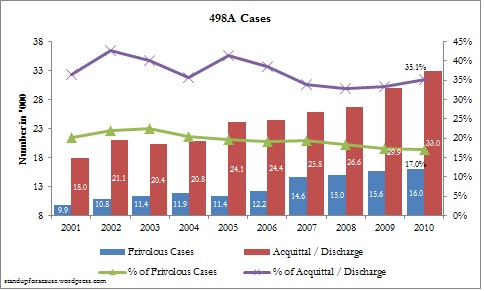In the recent landmark judgement by the Apex Court, it was directed that there should not be any automatic arrest for cases under section 498A of the IPC until provisions of Section 41 of Cr.PC are satisfied.
Section 498A of the IPC was inserted in the code in 1983 with a backdrop to curb torture of married women by the in-laws for dowry. As per the Supreme Court in B.S. Joshi vs. State of Haryana, the object of introducing Section 498A in the Indian Penal Code was to prevent the torture to a woman by her husband or by relatives of her husband. Section 498A was added with a view to punishing a husband and his relatives who harass or torture the wife to coerce her or her relatives to satisfy unlawful demands of dowry.
Though the backdrop of the provision was to prevent the menace of dowry there were many instances where a complaint was filed with oblique motives. The acquittal of the accused does not wipe out the ignomy suffered during the trial period. By the misuse of the provision a new legal terrorism can be unleashed. The provision is intended to be used a shield and not assassins’ weapon, observed the Supreme Court in Sushil Kumar Sharma vs Union Of India.
There have been many articles stating that the recent SC judgement has weakened the anti-dowry laws. Certain reasons for such a statement were:
1. Complainant required to negotiate with perpetrator: It is said that the complainant is forced to negotiate with the perpetrators. The incidences of frivolous cases has increased over the decade. In 2001 ‘one’ frivolous 498A case was filed per 53 minutes which has increased to ‘one’ frivolous case in 33 minutes till 2010[i]. This is a whooping 62% jump in 10 years. Due to such high incidences of frivolous cases, there could be a situation where in case of a preliminary inquiry and no merit being found in the case, a reconciliation may be promoted to save the marriage.
2. Low conviction rate does not imply misuse: The statement on the face sounds true, but to correctly substantiate, we must see the incidents of frivolous cases, which is as high as one case in 33 minutes. As a percentage, frivolous cases are in the range of 17% – 22%. The chart below on 498A incidents shows a clear picture of high frivolous cases.

Let us understand what does this judgement talks about. The judgement states that there should not be any mechanical arrest in 498A cases. The police should investigate and if there is a prima facie case, should they proceed to arrest. In case of a mechanical arrest, which was prevalent earlier, but just an accusation by the wife, the whole family of the husband used to be behind bars. There have been cases where the entire family of the husband such as his mother, sisters, bhabhis, other female relatives, ailing parents were booked under this section and were arrested. Even people who came to help the victim were booked. There have been cases where a dog’s name has been put in the complaint and even a 2 month old baby got an anticipatory bail under this section.
Looking at the above extent of misuse the hon’able SC has given directions to implement the CrPC section 41 in case of arrest for crimes where punishment is under 7 years (such crimes include 498A crimes).
Prior to arrest,:
1. Police Officer is satisfied that such arrest is necessary –
a. To prevent such person from committing any further offense ;
b. For proper investigation of the offense;
c. To prevent such person from causing the evidence of the offense to disappear or tampering with such evidence in any manner;
d. To prevent such person from making any inducement, threat or promise to any person acquainted with the facts of the case so as to dissuade him from disclosing such facts to the Court or to the police officer;
e. As unless such person is arrested, his presence in the Court whenever required cannot be ensured
2. The arresting officer also needs to ensure:
- Why arrest?
- Is it really required?
- What purpose it will serve?
- What object it will achieve?
The constitution of India, provides the most cherished guarantee in the world as per article 21, Protection of Life and Personal Liberty. This fundamental right states that personal liberty of a citizen will not be taken away without the process established by law. The process of law for arrests is given in Section 41 of CrPC, which is as discussed above.
I fail to understand how does arresting a person as per this process has weakened the anti-dowry laws.
Let us all Stand Up for a Cause.
[i] NCRB: Frivolous cases include: a) cases withdrawn by the govt. during investigation, b) cases withdrawn by the govt, c) cases compounded or withdrawn, d) cases not investigated or in which investigation was refused, e) cases declared false on account of mistake of fact or of law
Join LAWyersClubIndia's network for daily News Updates, Judgment Summaries, Articles, Forum Threads, Online Law Courses, and MUCH MORE!!"
Tags :Others

















